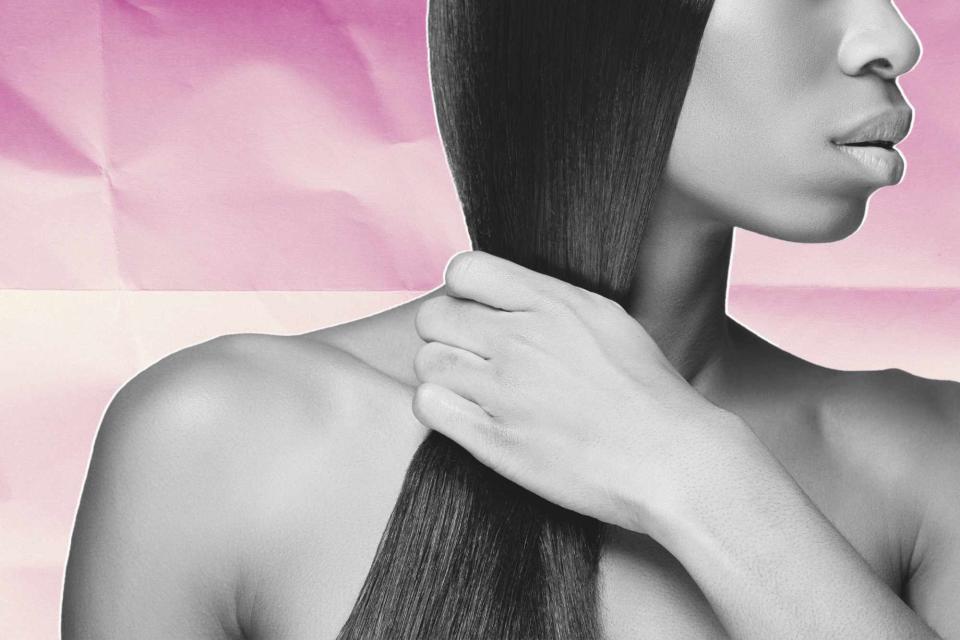Frequent Use of Chemical Hair Straighteners May Increase Risk of Uterine Cancer — Here's What You Need to Know
An expert helps explain new research that connects hair straightening chemicals with greater risk of uterine cancer.

You might not think of cancer risk when styling your hair, but new research shows chemicals used for straightening hair may put users at greater risk for uterine cancer.
A study conducted by the National Institutes of Health was published in the Journal of the National Cancer Institute in October 2022. It found that "women who used chemical hair straightening products were at higher risk for uterine cancer compared to women who did not report using these products," according to a release from the National Institute of Environmental Health Sciences (NIEHS).
The study looked for risk factors for breast cancer among other health conditions and included 33,497 women between the ages of 35 and 74. Women who reported "frequent use" of the products — or more than four times in the past year — were two times as likely to develop uterine cancer than participants who did not use chemical hair straightening products.
That rate is concerning, Nicole Deziel, Ph.D., M.H.S., an associate professor of epidemiology and cancer prevention and control member at the Yale Cancer Center, tells Shape. "This adds to a growing body of research showing that use of many hair-care products and other personal care products may be contributing to increasing trends in cancer and other adverse health outcomes," says Deziel.
Uterine cancer is relatively rare, said Alexandra White, Ph.D., head of the NIEHS environment and cancer epidemiology group and lead author on the new study, in the release. It only makes up about 3 percent of new cancer cases, according to the National Cancer Institute. While it's not the most common form of cancer overall, it is the most commonly found cancer of the female reproductive system. Additionally, uterine cancer cases have been on the rise since 2000, especially among Black women, added the NIEHS, citing a study from 2019.
Nearly 60 percent of the recent study subjects who reported using chemical straighteners in the year prior self-identified as Black women. While the results did not show any difference between straightener use and uterine cancer incidence by race, the negative health effects could be greater for Black women due to a higher prevalence of use, noted the NIEHS.
"Because Black women use hair straightening or relaxer products more frequently and tend to initiate use at earlier ages than other races and ethnicities, these findings may be even more relevant for them," Che-Jung Chang, Ph.D., an author of the new study and a research fellow in the NIEHS epidemiology branch, said in the release.
:
Since the study was published, four Black women diagnosed with uterine cancer and tumors have filed federal lawsuits against L'Oréal and other companies, according to NBC News. They claim that chemicals in the companies' hair products caused them to develop uterine cancer or other severe health problems. The women weren't aware of the increased risk of cancer associated with using chemical hair straighteners until the study was released, they allege in the lawsuit.
"If I had known all those years ago, if they had a warning on the box to say this could cause cancer, I wouldn't have used it," Rhonda Terrell, who was diagnosed with an aggressive form of uterine cancer, told NBC News.
Existing studies have found chemical hair straighteners can increase women's risk of developing hormone-related cancers, said the NIEHS in its release. For instance, the same team behind the most recent study also found that chemical hair straighteners and permanent hair dye could increase breast and ovarian cancer risk, according to a 2019 study.
When the latest study started, participants self-reported use of products, including chemical straighteners, hair dyes, relaxers, pressing products, body waves, and permanents in questionnaires. During the course of the nearly 11-year study, 378 cases of uterine cancer were diagnosed.
"We estimated that 1.64 percent of women who never used hair straighteners would go on to develop uterine cancer by the age of 70; but for frequent users, that risk goes up to 4.05 percent," said White in the October release.
:
It's important to note that the use of products and cancer incidence were self-reported by the study participants. Self-reporting can leave room for error, but it's still worth paying attention to the study's findings, says Deziel. "While people may not report their product use completely accurately, the fact that the surveys were administered before women developed cancer means that having cancer couldn't have influenced how they responded," explains Deziel. "So, while there may be some errors, it wouldn't be expected to bias the results."
The researchers did not track specific brand or ingredient information from the women in the study. However, they do note that there are chemicals found in chemical straighteners, including bisphenol A (commonly referred to as BPA), parabens, formaldehyde, and metals, that could be contributing to the higher uterine cancer risk found.
So, should this new research stop you from using chemical hair straighteners?
"The study found the highest risk for women who used straighteners frequently — four times or more per year — so, if people are concerned about these products, reducing the frequency of use of straighteners would certainly reduce exposures to the chemicals in the products and could potentially lower cancer risk," explains Deziel.
However, the study's findings are indicative of larger issues, continues Deziel. For example, some consumer products include ingredients that contain carcinogens to begin with. Also, Eurocentric beauty standards favor straight hair, possibly pushing people who don't fit into those ideals to use potentially harmful products to achieve a different hairstyle.
:
"The burden should not be solely on individuals to grapple with potentially putting themselves at risk versus meeting societal or their own ideas about beauty or having to spend more money on alternative, less-toxic products (if they exist)," says Deziel.

